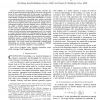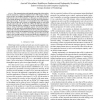1625 search results - page 50 / 325 » Achievable performance improvements provided by cooperative ... |
140
click to vote
TWC
2010
14 years 8 months ago
2010
Cooperative forwarding in wireless networks has shown to yield rate and diversity gains, but it incurs energy costs borne by the cooperating nodes. In this paper we consider an inc...
112
click to vote
ASWEC
2005
IEEE
15 years 7 months ago
2005
IEEE
Robots have diverse capabilities and complex interactions with their environment. Software development for robotic platforms is time consuming due to the complex nature of the tas...
102
click to vote
IPPS
2005
IEEE
15 years 7 months ago
2005
IEEE
The scheduler is a key component in determining the overall performance of a parallel computer, and as we show here, the schedulers in wide use today exhibit large unexplained gap...
116
click to vote
EWSN
2008
Springer
16 years 1 months ago
2008
Springer
Clustering is an important mechanism in large multi-hop wireless sensor networks for obtaining scalability, reducing energy consumption and achieving better network performance. Mo...
INFOCOM
2005
IEEE
15 years 7 months ago
2005
IEEE
—The communication model typically assumed in wireless ad-hoc networks is based on a traditional “pipelined relay” (PR) strategy. In PR, an end-to-end flow has multiple outs...


